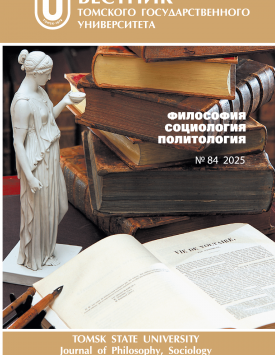The “realism” of analytic philosophy: a crooked mirror
The subject of the article is a criticism of the concept of translation of analytical texts, presented by S. Nikonenko in the definition of institutional and theoretical contours of the Tomsk school. It is shown that his proposed reconstruction of the discourse and methodology of working with analytical texts contains serious factual errors complicated by the substitution of the translation concept with the translator’s own philosophical views. Although Nikonenko considers two special cases, firstly, the translation into Russian of works of analytic philosophy, and, secondly, the practice of such translation by Tomsk philosophers, the discussion is characterized by several beliefs, or rather, Nikonenko’s prejudices. These latter, in the form of implicit assumptions, from my point of view, significantly distort both the goals of translation of foreign philosophers and the work done by translators themselves. Thus, the aim of this note is to assess the degree of distortion and try to present a more objective picture. According to Nikonenko, the translation of analytical texts does not act as a craft peculiar to a significant range of discourses, but as some kind of embodiment of the principles and views that Tomsk philosophers profess and follow them strictly within a rather rigid paradigm. Indeed, “realism can be singled out as the ideological and theoretical setting of the Tomsk school”. The “realism” that Nikonenko attributed to Tomsk philosophers is understood by him as a philosophical virtue, since it serves as a support for their critical position against the anti-realistic, idealistic and relativistic currents of analytic philosophy (which are automatically credited to its vices). And here begins the confusion that is characteristic of the entire Nikonenko’s essay. He does not distinguish between these two types of work, one of which relates to the quality of translation, and the second to the translator’s possible critical assessment of the position of the work in question. The “realism” of Tomsk philosophers as translators looks like a completely inappropriate characteristic in Nikonenko’s description, since I do not see any common position among all Tomsk philosophers engaged in translations, and even more so, realism. Nikonenko’s mistake is attributing to representatives of the Tomsk school the desire to “edit”, “finish”, “think out” the translated text. Here Nikonenko passes off the “mortal sin” of translators as a virtue. Fortunately, this sin is in no way peculiar to the Tomsk school; Nikonenko’s very idea to portray the translation work of Tomsk philosophers in this light is a splint, and I strongly object to this kind of oversimplification in evaluating the careful and subtle work that is inherent in Tomsk analytic philosophers. The author declares no conflicts of interests.
Keywords
analytic philosophy, Tomsk school, translation concept, realism, textAuthors
| Name | Organization | |
| Tselishchev Vitaly V. | Institute of Philosophy and Law, Siberian Branch of the Russian Academy of Sciences | leitval@gmail.com |
References

The “realism” of analytic philosophy: a crooked mirror | Tomsk State University Journal of Philosophy, Sociology and Political Science. 2025. № 84. DOI: 10.17223/1998863X/84/23
